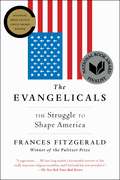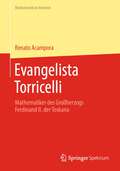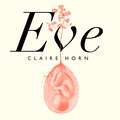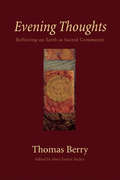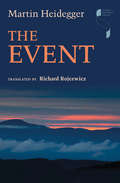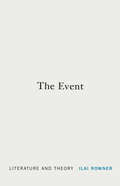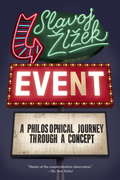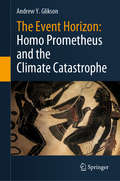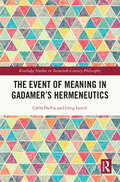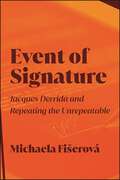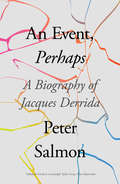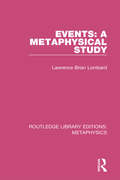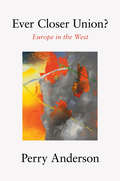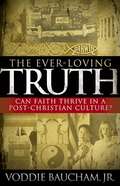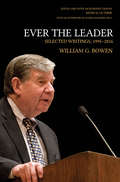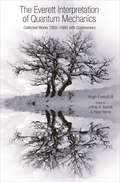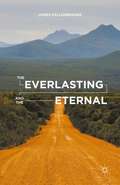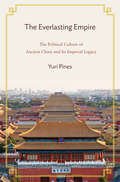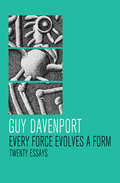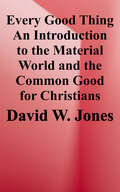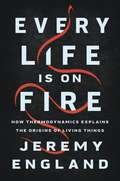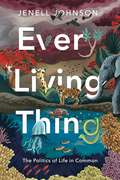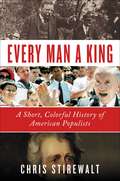- Table View
- List View
The Evangelicals: The Struggle to Shape America
by Frances Fitzgerald“A page turner…We have long needed a fair-minded overview of this vitally important religious sensibility, and FitzGerald has now provided it.” —The New York Times Book Review “FitzGerald’s brilliant book could not have been more timely, more well-researched, more well-written, or more necessary.” —The American Scholar This groundbreaking book from Pulitzer Prize–winning historian Frances FitzGerald is the first to tell the powerful, dramatic story of the Evangelical movement in America—from the Puritan era to the 2016 presidential election.The evangelical movement began in the revivals of the eighteenth and nineteenth centuries, known in America as the Great Awakenings. A populist rebellion against the established churches, it became the dominant religious force in the country. During the nineteenth century white evangelicals split apart dramatically, first North versus South, and then at the end of the century, modernist versus fundamentalist. After World War II, Billy Graham, the revivalist preacher, attracted enormous crowds and tried to gather all Protestants under his big tent, but the civil rights movement and the social revolution of the sixties drove them apart again. By the 1980s Jerry Falwell and other southern televangelists, such as Pat Robertson, had formed the Christian right. Protesting abortion and gay rights, they led the South into the Republican Party, and for thirty-five years they were the sole voice of evangelicals to be heard nationally. Eventually a younger generation of leaders protested the Christian right’s close ties with the Republican Party and proposed a broader agenda of issues, such as climate change, gender equality, and immigration reform. Evangelicals have in many ways defined the nation. They have shaped our culture and our politics. Frances FitGerald’s narrative of this distinctively American movement is a major work of history, piecing together the centuries-long story for the first time. Evangelicals now constitute twenty-five percent of the American population, but they are no longer monolithic in their politics. They range from Tea Party supporters to social reformers. Still, with the decline of religious faith generally, FitzGerald suggests that evangelical churches must embrace ethnic minorities if they are to survive.
Evangelista Torricelli: Mathematiker des Großherzogs Ferdinand II. der Toskana (Mathematik im Kontext)
by Renato AcamporaDie meisten Nichtmathematiker werden Torricelli durch das nach ihm benannte Ausflussgesetz kennen, wonach die Geschwindigkeit eines aus einem Gefäss austretenden Wasserstrahls proportional zur Quadratwurzel aus der Füllhöhe ist, ebenso wie durch seinen Nachweis des Luftdrucks mithilfe seines Vakuumexperiments. Viel bedeutender aber sind seine Leistungen auf dem Gebiet der Mathematik als virtuoser Vertreter von Cavalieris umstrittener Indivisiblenmethode, wobei er seine Ergebnisse aber stets mit Beweisen nach der allgemein anerkannten „Art der Alten“ absicherte. Auf diese Weise gelang ihm die Quadratur der Parabeln und Hyperbeln höherer Ordnung, der Zykloide, der logarithmischen Spirale (ebenso wie deren Rektifikation) und die Bestimmung der Schwerpunkte zahlreicher ebener und räumlicher Figuren.
Eve: The Disobedient Future of Birth
by Claire HornThroughout human history, every single one of us has been born from a person. So far. But that is about to change.Scientific research is on the cusp of being able to grow babies outside human bodies, from machines, for the very first time. Claire Horn takes us on a truly radical and urgent deep dive into the most challenging and pertinent questions of our age. Could artificial wombs allow women to redistribute the work of gestating? How do we protect reproductive and abortion rights? And who exactly gets access to this technology, in ourvastly unequal world?In this interrogative and fascinating story of modern birth, Eve imagines with eyeopening clarity what all this might mean for the future of humanity.
Evening Thoughts: Reflecting on Earth as Sacred Community
by Thomas Berry Mary Evelyn TuckerAmong the contemporary voices for the Earth, none resonates like that of noted cultural historian Thomas Berry. His teaching and writings have inspired a generation's thinking about humankind's place in the Earth community and the universe, engendering widespread critical acclaim and a documentary film on his life and work.This new collection of essays, from various years and occasions, expands and deepens ideas articulated in his earlier writings and also breaks new ground. Berry opens our eyes to the full dimensions of the ecological crisis, framing it as a crisis of spiritual vision. Applying his formidable erudition in cultural history, science, and comparative religions, he forges a compelling narrative of creation and communion that reconciles modern evolutionary thinking and traditional religious insights concerning our integral role in Earth's society.While sounding an urgent alarm at our current dilemma, Berry inspires us to reclaim our role as the consciousness of the universe and thereby begin to create a true partnership with the Earth community. With Evening Thoughts, this wise elder has lit another beacon to lead us home.
The Event: Event (Studies in Continental Thought)
by Martin HeideggerThis elegantly translated collection of Heidegger&’s private later writings is &“illuminating to some of his most difficult discussions.&” (Phillip Braunstein, Loyola Marymount College). Martin Heidegger&’s The Event offers the most in-depth articulation of his later work&’s most foundational concept, as well as his most substantial self-critique of his Contributions to Philosophy: Of the Event. Written between 1936 and 1944, and published posthumously as volume 71 of his Complete Works, The Event collects Heidegger&’s private writings in response to his Contributions. Richard Rojcewicz&’s faithful and straightforward translation offers the English-speaking reader intimate contact with the author&’s process of formulating some of his most important concepts. This book lays out how the Event is to be understood and ties it closely to looking, showing, self-manifestation, and the self-unveiling of the gods.
The Event: Literature and Theory
by Ilai RownerWhat is an event? From a philosophical perspective, events are irregular occurrences—moments of change and interruption—categorized by human perception, language, and thought. While philosophers have pored over the subject of events extensively in recent years, The Event: Literature and Theory seeks to ground it: What is literature’s approach to the event? How does literature produce and give testimony to events? Ilai Rowner’s study not only revisits some of the most important thinkers of our time, including Maurice Blanchot, Gilles Deleuze, Jacques Derrida, and Martin Heidegger, it also develops a critical approach to literature that questions the meaning of the literary event through examinations of literary works by Marcel Proust, Louis-Ferdinand Céline, and T. S. Eliot. Rowner offers a new method of thinking about the particular characteristics of the event within literary works and defines the creative value of literature as the aspiration toward the un-happening within the happening. In this study the experience of literature—as an act of both writing and reading—becomes the struggle to capture the excessive movement of the event while also revealing the creative energy within that work of literature.
Event
by Slavoj ZizekProbably the most famous living philosopher, Slavoj i ek explores the meaning of events in this short and digestible book An event can be an occurrence that shatters ordinary life, a radical political rupture, a transformation of reality, a religious belief, the rise of a new art form, or an intense experience such as falling in love. Taking us on a trip that stops at different definitions of event, i ek addresses fundamental questions such as: are all things connected? How much are we agents of our own fates? Which conditions must be met for us to perceive something as really existing? In a world that's constantly changing, is anything new really happening? Drawing on references from Plato to arthouse cinema, the Big Bang to Buddhism, Event is a journey into philosophy at its most exciting and elementary.From the Trade Paperback edition.
The Event Horizon: Homo Prometheus and the Climate Catastrophe
by Andrew Y. GliksonWith the advent of global warming and the nuclear arms race, humans are rapidly approaching a moment of truth. Technologically supreme, they manifest their dreams and nightmares in the real world through science, art, adventures and brutal wars, a paradox symbolized by a candle lighting the dark yet burning away to extinction, as discussed in this book. As these lines are being written, fires are burning on several continents, the Earth’s ice sheets are melting and the oceans are rising, threatening to flood the planet’s coastal zones and river valleys, where civilization arose and humans live and grow food. With the exception of birds like hawks, black kites and fire raptors, humans are the only life form utilizing fire, creating developments they can hardly control. For more than a million years, gathered around campfires during the long nights, mesmerized by the flickering life-like dance of the flames, prehistoric humans acquired imagination, a yearning for omnipotence, premonitions of death, cravings for immortality and conceiving the supernatural. Humans live in realms of perceptions, dreams, myths and legends, in denial of critical facts, waking up for a brief moment to witness a world that is as beautiful as it is cruel. Existentialist philosophy offers a way of coping with the unthinkable. Looking into the future produces fear, an instinctive response that can obsess the human mind and create a conflict between the intuitive reptilian brain and the growing neocortex, with dire consequences. As contrasted with Stapledon’s Last and first Man, where an advanced human species mourns the fate of the Earth, Homo sapiens continues to transfer every extractable molecule of carbon from the Earth to the atmosphere, the lungs of the biosphere, ensuring the demise of the planetary life support system.”
The Event of Meaning in Gadamer’s Hermeneutics (Routledge Studies in Twentieth-Century Philosophy)
by Carlo DaVia Greg LynchThis book presents the first detailed treatment of Gadamer’s account of the nature of meaning. It argues both that this account is philosophically valuable in its own right and that understanding it sheds new light on his wider hermeneutical project.Whereas philosophers have typically thought of meanings as belonging to a special class of objects, the central claim of Gadamer’s view is that meanings are events. Instead of a pre-existing content that we must unearth through our interpretive efforts, for Gadamer the meaning of a text is what happens when we encounter it in the appropriate way. In events of meaning the world makes itself intelligibly present to us in a manner that is uniquely and irreducibly bound up with the concrete situation in which we find ourselves. When we recognize that Gadamer thinks of meaning in this way, we are better positioned to appreciate what his wider views amount to and how they hang together. Gadamer’s accounts of interpretive normativity, the aspectival character of understanding, and the nature of essences, for example, snap into more vivid relief when we see them as outgrowths of his underlying conception of meanings as events.The Event of Meaning in Gadamer’s Hermeneutics will especially appeal to researchers and advanced students working in hermeneutics, phenomenology, and the philosophy of language. More broadly it will be of interest to humanities teachers and researchers concerned with the question of how texts from distant cultures can be relevant to readers here and now.
Event of Signature: Jacques Derrida and Repeating the Unrepeatable (SUNY series in Contemporary French Thought)
by Michaela FiserovaEvent of Signature formulates a new philosophical problem which focuses on the handwritten signature as sign of legal identification. Author Michaela Fišerová works with three metaphysical expectations, which are shared in discourses of graphology and forensic analysis. The first expectation tends to reveal the signer's soul: a handwritten signature "naturally" mirrors the unique psychological qualities of the signer. The second expectation tends to guarantee the originality of the signer's trace: a handwritten signature proves physical contact between the signed document and the writing tool "authentically" moved by the signer's hand. The third expectation tends to recognize the signer's legal identity: a handwritten signature is expected to reproduce the signer's personal style, which enables identification by legal authorities. In a methodologically inventive and semiotically-based dialogue with Derrida's deconstruction, Fišerová situates this triple expectation in the interval between life and law. Challenging coverage of this topic finally shows that none of the metaphysical expectations will ever be fulfilled in the event of manual signing. Legal uses of handwritten signature are characterized by the complex aporia of repeating the unrepeatable.
The Event of the Thing
by Michael MarderJacques Derrida's writings often embed the key themes of deconstruction in a notion of the thing. The Event of the Thing is the most complete examination to date of Derrida's understanding of thinghood and its crucial role in psychoanalysis, ethics, literary theory, aesthetics, and Marxism. Arguing that the thing, as a figure of otherness, destabilizes the metaphysical edifice it underlies, Michael Marder reveals the contributions it makes to critiques of humanism and idealism. Subsequently, the new realism that emerges from deconstruction holds the possibility of an event that problematizes all attempts to objectify the thing. An illuminating analysis of Derrida and phenomenology, The Event of the Thing is an innovative and compelling study of a crucial aspect of one of the twentieth century's greatest thinkers.
An Event, Perhaps: A Biography of Jacques Derrida
by Peter SalmonPhilosopher, film star, father of &“post truth&”—the real story of Jacques DerridaWho is Jacques Derrida? For some, he is the originator of a relativist philosophy responsible for the contemporary crisis of truth. For the far right, he is one of the architects of Cultural Marxism. To his academic critics, he reduced French philosophy to &“little more than an object of ridicule.&” For his fans, he is an intellectual rock star who ranged across literature, politics, and linguistics. In An Event, Perhaps, Peter Salmon presents this misunderstood and misappropriated figure as a deeply humane and urgent thinker for our times. Born in Algiers, the young Jackie was always an outsider. Despite his best efforts, he found it difficult to establish himself among the Paris intellectual milieu of the 1960s. However, in 1967, he changed the whole course of philosophy: outlining the central concepts of deconstruction. Immediately, his reputation as a complex and confounding thinker was established. Feted by some, abhorred by others, Derrida had an exhaustive breadth of interests but, as Salmon shows, was moved by a profound desire to understand how we engage with each other. It is a theme explored through Derrida&’s intimate relationships with writers sucheven as Althusser, Genet, Lacan, Foucault, Cixous, and Kristeva. Accessible, provocative and beautifully written, An Event, Perhaps will introduce a new readership to the life and work of a philosopher whose influence over the way we think will continue long into the twenty-first century.
Events: A Metaphysical Study (Routledge Library Editions: Metaphysics)
by Lawrence Brian LombardOriginally published in 1986. The theory of events presented is one that construes events to be concrete particulars; and it embodies an attempt to take seriously the idea that events are the changes that objects undergo when they change. The theory is about what an event really is, about when events are identical, about what properties events have essentially, and about what relations events bear to entities of other kinds. In addition, this book contains an account of what philosophers are up to when they provide reasons for thinking that objects belonging to metaphysically interesting kinds exist. It also gives an account of the role of criteria of identity (eg. identical sets must have the same members) in such reasons, and an account of what criteria of identity must be like in order for them to be able to play such a role.
Ever Closer Union?: Europe in the West
by Perry AndersonA comprehensive, critical assessment of the EU after BrexitThe European Union is a political order of peculiar stamp and continental scope, its polity of 446 million the third largest on the planet, though with famously little purchase on the conduct of its representatives. Sixty years after the founding treaty, what sort of structure has crystallised, and does the promise of ever closer union still obtain?Against the self-image of the bloc, Perry Anderson poses the historical record of its assembly. He traces the wider arc of European history, from First World War to Eurozone crisis, the hegemony of Versailles to that of Maastricht, and casts the work of the EU&’s leading contemporary analysts – both independent critics and court philosophers – in older traditions of political thought. Are there likenesses to the age of Metternich, lessons in statecraft from that of Machiavelli?An excursus on the UK&’s jarring departure from the Union considers the responses it has met with inside the country&’s intelligentsia, from the contrite to the incandescent. How do Brussels and Westminster compare as constitutional forms? Differently put, which could be said to be worse?
The Ever-Loving Truth: Can Faith Survive In A Post-Christian Culture?
by Voddie BauchamCan Christian faith survive in a post-Christian culture?
Ever the Leader: Selected Writings, 1995-2016
by William G. Bowen Hanna Holborn Gray Kevin M. GuthrieEver the Leader gathers together selected speeches and writings from one of the great scholars and commentators of higher education. William G. Bowen’s career at Princeton University—from economics professor to provost to a sixteen-year tenure as president—was marked by extraordinary accomplishments during times of great change, both at the university and in the country. But it was in Bowen’s second act, as president of the Andrew W. Mellon Foundation and founding chairman of ITHAKA, that he took the lessons he learned as a highly productive leader of one of the nation’s most esteemed universities and applied them to a broader set of problems in higher education. This volume of work from Bowen’s later career captures this expansion of his thought and influence.Comprising remarks and articles on the subjects of university values, educational opportunity, college sports, technology, and colleagues and peers in higher education leadership, Ever the Leader is more than just a concise distillation of Bowen’s research and thinking on some of the most urgent issues of the day—it is a portrait of leadership in action. The selected papers, talks, and articles exemplify Bowen’s commitment and singular ability to communicate strong, persuasive arguments for change, and to motivate others to engage with the truly hard questions facing higher education leaders.Filled with formidable insights, Ever the Leader will be required reading for university presidents, policymakers, and all those who carry on the struggle for equity and excellence in higher education.
The Everett Interpretation of Quantum Mechanics: Collected Works 1955-1980 with Commentary
by Jeffrey A. Barrett and Peter ByrneHugh Everett III was an American physicist best known for his many-worlds interpretation of quantum mechanics, which formed the basis of his PhD thesis at Princeton University in 1957. Although counterintuitive, Everett's revolutionary formulation of quantum mechanics offers the most direct solution to the infamous quantum measurement problem--that is, how and why the singular world of our experience emerges from the multiplicities of alternatives available in the quantum world. The many-worlds interpretation postulates the existence of multiple universes. Whenever a measurement-like interaction occurs, the universe branches into relative states, one for each possible outcome of the measurement, and the world in which we find ourselves is but one of these many, but equally real, possibilities. Everett's challenge to the orthodox interpretation of quantum mechanics was met with scorn from Niels Bohr and other leading physicists, and Everett subsequently abandoned academia to conduct military operations research. Today, however, Everett's formulation of quantum mechanics is widely recognized as one of the most controversial but promising physical theories of the last century. In this book, Jeffrey Barrett and Peter Byrne present the long and short versions of Everett's thesis along with a collection of his explanatory writings and correspondence. These primary source documents, many of them newly discovered and most unpublished until now, reveal how Everett's thinking evolved from his days as a graduate student to his untimely death in 1982. This definitive volume also features Barrett and Byrne's introductory essays, notes, and commentary that put Everett's extraordinary theory into historical and scientific perspective and discuss the puzzles that still remain.
The Everlasting and the Eternal
by J. KellenbergerThe subject of this book is the relationship and the difference between the temporal everlasting and the atemporal eternal. This book treats the difference between a temporal postmortem life and eternal life. It identifies the conceptual tension in the religious idea of eternal life and offers a resolution of that tension.
The Everlasting Check: Hume on Miracles
by Alexander GeorgeAlexander George's lucid interpretation of Hume's "Of Miracles" provides fresh insights into this provocative text, explaining the concepts and claims involved. He also shows why Hume's argument fails to engage with committed religious thought and why philosophical argumentation so often proves ineffective in shaking people's deeply held beliefs.
The Everlasting Empire: The Political Culture of Ancient China and Its Imperial Legacy
by Yuri PinesEstablished in 221 BCE, the Chinese empire lasted for 2,132 years before being replaced by the Republic of China in 1912. During its two millennia, the empire endured internal wars, foreign incursions, alien occupations, and devastating rebellions--yet fundamental institutional, sociopolitical, and cultural features of the empire remained intact. The Everlasting Empire traces the roots of the Chinese empire's exceptional longevity and unparalleled political durability, and shows how lessons from the imperial past are relevant for China today. Yuri Pines demonstrates that the empire survived and adjusted to a variety of domestic and external challenges through a peculiar combination of rigid ideological premises and their flexible implementation. The empire's major political actors and neighbors shared its fundamental ideological principles, such as unity under a single monarch--hence, even the empire's strongest domestic and foreign foes adopted the system of imperial rule. Yet details of this rule were constantly negotiated and adjusted. Pines shows how deep tensions between political actors including the emperor, the literati, local elites, and rebellious commoners actually enabled the empire's basic institutional framework to remain critically vital and adaptable to ever-changing sociopolitical circumstances. As contemporary China moves toward a new period of prosperity and power in the twenty-first century, Pines argues that the legacy of the empire may become an increasingly important force in shaping the nation's future trajectory.
Every Force Evolves a Form: Twenty Essays
by Guy DavenportDavenport's subjects range from Montaigne to Making It Uglier to the Airport, from the influence of Krazy Kat on e. e. cummings to the influence of Pergolesi's dog on artist Joseph Cornell. The New York Times hailed him as one of the most gifted and versatile men of letters.
Every Good Thing: An Introduction to the Material World and the Common Good for Christians (SEBTS)
by David W. JonesThe physical world around us should have just as much bearing on how Christians act and think as the life to come. But Christians often don't understand how the Bible speaks directly to this important aspect of everyday life. <p><p>In Every Good Thing, David W. Jones illustrates the wide variety of areas--wealth and poverty, tithing and creation-care, vocation and Sabbath--impacted by our understanding of the Bible's teaching on the material realm. This short book surveys key concepts and controversies on each topic, accompanied by Bible passages to help readers develop a more robust worldview of the physical world around us. After all, Christians should take the life of Christ as an example for their own--and his life on earth reflected a deep concern for and engagement with the world in which he walked and breathed, worked and lived. So, too, God calls us to think biblically about how our beliefs impact our material lives.
Every Life Is on Fire: How Thermodynamics Explains the Origins of Living Things
by Jeremy EnglandA preeminent physicist unveils a field-defining theory of the origins and purpose of life.Why are we alive? Most things in the universe aren't. And everything that is alive traces back to things that, puzzlingly, weren't. For centuries, the scientific question of life's origins has confounded us. But in Every Life Is on Fire, physicist Jeremy England argues that the answer has been under our noses the whole time, deep within the laws of thermodynamics. England explains how, counterintuitively, the very same forces that tend to tear things apart assembled the first living systems.But how life began isn't just a scientific question. We ask it because we want to know what it really means to be alive. So England, an ordained rabbi, uses his theory to examine how, if at all, science helps us find purpose in a vast and mysterious universe.In the tradition of Viktor Frankl's Man's Search for Meaning, Every Life Is on Fire is a profound testament to how something can come from nothing.
Every Living Thing: The Politics of Life in Common (RSA Series in Transdisciplinary Rhetoric)
by Jenell JohnsonThis book examines the question of what we mean when we talk about life, revealing new insights into what life is, what it does, and why it matters. Jenell Johnson studies arguments on behalf of life—not just of the human or animal variety, but all life. She considers, for example, the Standing Rock Sioux tribe’s fight for water, deep ecologists’ Earth First! activism, the Voluntary Human Extinction Movement, and astrophysicists’ positions on Martian microbes. What she reveals is that this advocacy—vital advocacy—expands our view of what counts as life and shows us what it would mean for the moral standing of human life to be extended to life itself.Including short interviews with celebrated ecological writer Dorion Sagan, former NASA Planetary Protection Officer Catharine Conley, and leading figure in Indigenous and environmental studies Kyle Whyte, Every Living Thing provides a capacious view of life in the natural world. This book is a must-read for anyone interested in biodiversity, bioethics, and the environment.
Every Man a King: A Short, Colorful History of American Populists
by Chris StirewaltFrom Fox News' politics editor Chris Stirewalt -- a fun and lively account of America's populist tradition, from Andrew Jackson and Teddy Roosevelt, to Ross Perot, Pat Buchanan, and Donald Trump. p.p1 {margin: 0.0px 0.0px 0.0px 0.0px; font: 12.0px 'Helvetica Neue'; -webkit-text-stroke: #000000} span.s1 {font-kerning: none} Whatever the ideological fad of the moment, American populism has always been home to a fascinating assortment of charismatic leaders, characters, kooks, cranks, and sometimes charlatans who have - with widely varying degrees of success - led the charge of ordinary folks who have gotten wise to the ways of the swamp.This attitude of skeptical resentment also makes populism a fertile field for the work of conspiracy theorists and other enthusiastic apostates from civic convention. After all, if the people in power are found to be rigging one part of the system, why not the rest?EVERY MAN A KING tells the stories of America's populist leaders, from an elderly Andrew Jackson brutally caning his would-be-assassin, to William Jennings Bryan's pre-speech routine that combined equally prodigious quantities of prayer and food, to Ross Perot's military-style campaign that made even volunteers wear badges with stars to show rank. It is a rollicking history of an American attitude that has shaped not only our current moment, but also the long struggle over who gets to define the truths we hold to be self evident.
